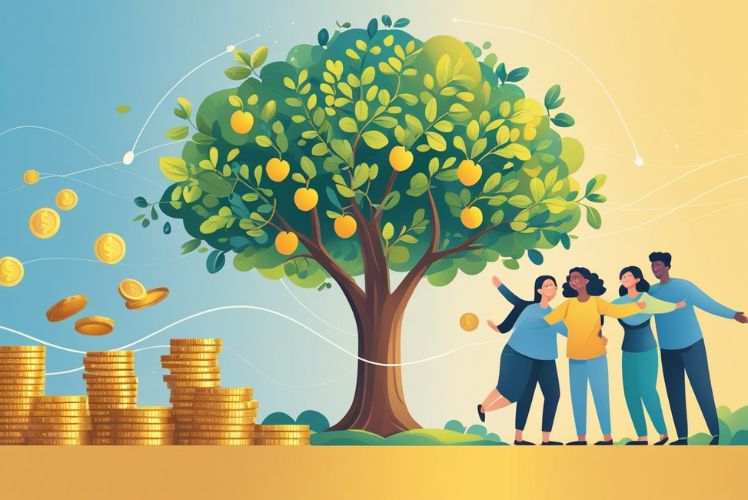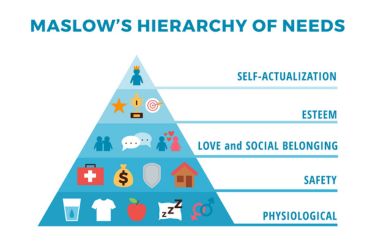Many of us wonder if having more money can truly make us happier. Research shows that money and wealth can increase happiness, but only up to a certain point. How we compare our financial situation to others also affects how satisfied we feel in our daily lives.
We often think that more wealth will solve all our problems, but the reality is more complicated. The impact of money on happiness depends on factors like stability, long-term financial health, and even our sense of purpose. In the end, real happiness includes more than just our bank accounts and pay rises, as explored in studies on money, wealth, and subjective well-being.
Key Takeaways
- Money and wealth can improve happiness, but only to a certain degree.
- Comparing our income to others often affects our life satisfaction.
- Real happiness relies on factors beyond just money and wealth.
Understanding Money, Wealth, and Happiness

How we view money, wealth, and happiness shapes our choices and sense of well-being. These concepts are closely linked, but each represents something different and affects our lives in unique ways.
Definitions and Key Concepts
Money is anything widely accepted for buying goods and services. It includes both physical cash and digital balances in our bank accounts. Wealth, on the other hand, means the total value of what we own, like our savings, investments, and property, minus our debts. This is often called net worth.
Happiness refers to our overall satisfaction with life and our day-to-day mood. It can include feelings of joy, contentment, and life purpose. We need to note that wealth and money influence happiness, but they are not the same thing.
A helpful way to remember the difference is:
| Term | What It Means | Example |
|---|---|---|
| Money | Buying power | Cash in our wallet, balance in the bank |
| Wealth | Total assets, minus debts | Home, stocks, minus credit card debt |
| Happiness | Life satisfaction and well-being | How fulfilled or content we feel |
The Role of Socioeconomic Status
Our socioeconomic status combines our income, education, and occupation. It plays a big role in how we see our position in society. People with higher status often have more financial resources, which can make it easier to meet their needs and plan for the future.
However, research shows that our perception of where we stand—rather than the exact amount of money or wealth we have—has a powerful impact on our feelings of purpose and satisfaction. For instance, one study found that our sense of meaning can be shaped by how we compare ourselves to others in terms of resources.
In many countries, people with lower income but strong connections or life purpose still report high levels of happiness. This suggests that financial resources matter, but not as much as our personal values, relationships, and outlook.
Distinctions Between Money and Wealth
While money is what we use day to day, wealth represents longer-term financial security. Someone might earn a high income (lots of money) but have little wealth if they spend most of it and save very little. On the other hand, another person could have less income but have saved and invested well, so their wealth is much higher.
Wealth lets us deal with emergencies, plan for retirement, and support our families. Studies show that both permanent income and lasting wealth are better predictors of life satisfaction than short-term earnings. Both absolute and relative factors matter—meaning that not just the amount, but how it compares to those around us, can shape our happiness, as seen in findings about how income and wealth affect life satisfaction.
Understanding the gap between having money and building wealth helps us make smarter choices for our financial future and emotional well-being.
The Link Between Money and Well-Being

We see clear patterns in how money, wealth, and well-being are connected. These patterns depend on income levels, how people compare themselves to others, and the way research studies measure happiness.
Research Findings on Money and Greater Happiness
Research shows that more income is linked to higher well-being, but the effect weakens at higher income levels. For many, extra money can improve daily experiences and reduce stress about their financial situation.
Both absolute and relative income are important. People feel happier not just by having more, but also by being better off than their peers. Studies highlight that while permanent income and wealth can increase life satisfaction, temporary changes in income have a smaller impact. This finding has been seen in work such as the World Happiness Report, which tracks happiness and well-being across countries.
Greater wealth does not always guarantee long-term happiness, but it often makes life more comfortable and less stressful.
The Relationship Between Income and Life Satisfaction
Life satisfaction tends to rise with income, especially when people move out of poverty or financial hardship. When basic needs such as housing, food, and healthcare are met, we experience less worry and greater life satisfaction.
However, as income grows, its direct effect on happiness can shrink. Research compiled on money and happiness finds that people enjoy being wealthier than others, but the positive effects of income fade once a certain standard of living is reached.
Comparisons matter. If someone earns more than their friends or coworkers, they are often more satisfied, even if their total income is not very high.
Measurement and Methodology in Financial Happiness Studies
How researchers measure happiness and income affects our understanding of these issues. Some studies use self-reported life satisfaction, while others measure emotional well-being, such as daily moods or stress.
Methodology also matters. Cross-sectional surveys compare people at one point in time, while longitudinal studies follow groups over years. Both have strengths and limitations.
Researchers now look at not just income but also how people feel about their financial situation. For example, different definitions of happiness, such as emotional well-being or overall evaluation of life, can lead to different results. Consistency in methods is crucial for making accurate comparisons.
Wealth, Mental Health, and Subjective Well-Being
Wealth can affect not just our material comfort, but also our mental state and emotional health. How we handle money and resources can shape our experiences with mood disorders, daily happiness, and well-being.
Mental Health Outcomes and Mood Disorders
Wealth and financial stability have clear links to our mental health. Studies show that individuals with higher levels of wealth report lower rates of mood disorders, like anxiety and chronic stress. Stable finances can reduce the number of stressful events we experience and support better coping strategies.
However, having more money does not mean we are immune to mental health issues. Environmental factors, family history, and lifestyle choices still play big roles. Access to mental health care, which often improves with better finances, can also influence outcomes.
People with fewer resources may experience more stress due to uncertainty about their future. Chronic financial insecurity often increases vulnerability to anxiety and mood swings. Financial comfort, on the other hand, helps us build psychological resilience.
Impact of Financial Resources on Depression
Evidence shows that there is a strong connection between financial resources and depression. People living below the poverty line are much more likely to develop depressive symptoms. Struggling to meet basic needs, such as housing or food, increases stress and reduces our sense of control.
Having adequate financial resources makes it easier for us to access healthcare and social support. This can make a real difference in managing or preventing depression. In families with higher incomes, children often report better mental health as adults, partly due to lower exposure to financial stress.
Still, our expectations and comparisons with others matter. According to research, such as the findings reported by Springer, wealth affects well-being both in absolute and comparative terms. Feeling left behind, even if we are comfortable, may fuel negative emotions.
Socioeconomic Factors and Daily Happiness
Daily happiness is shaped by our socioeconomic status. People who feel secure in their finances often experience greater life satisfaction and enjoy more positive emotions. We see this pattern across different countries and age groups.
That said, we should not assume money alone guarantees happiness. Studies suggest that while extra income can lift our happiness, the effect levels off once basic needs are met. What matters most is how we use our resources, such as spending money on meaningful activities or supporting loved ones.
Social comparisons play a strong part. Our sense of well-being can drop if others around us seem to be doing better, even when our situation is good. As outlined by JSTOR’s review of the relationship between income and subjective well-being, relative wealth has as much impact as absolute income.
Relative Income, Comparison, and Satisfaction With Life
How we feel about our financial situation often depends on how our earnings and wealth compare to others. Our sense of satisfaction is shaped not only by how much we have, but also by our place within the social and economic landscape around us.
The Comparison Effect
The comparison effect describes how people evaluate their income and wealth based on what others have. This effect is noticeable at work, in our neighbourhoods, and even among friends.
Research shows that a person’s happiness is not only linked to absolute income, but also to their income relative to others close to them. When people feel they have less than their peers, their satisfaction with life tends to drop, even if their needs are met. In contrast, when people feel wealthier than those around them, their happiness often increases.
For example, a study using British Household Panel Survey data found that income rank in a reference group has significant effects on overall life satisfaction. This pattern is visible in many countries and cultures, suggesting the comparison effect is a common part of human psychology. More details about these findings can be found in this review of income rank and life satisfaction.
Relative Income and Utility
Relative income refers to our income compared to a reference group, rather than just the amount in pounds or dollars we earn. Our sense of utility, or the benefit we get from income, is influenced by this comparison.
When we focus on relative income, a pay increase might only bring more happiness if it puts us ahead of others in our group. If everyone’s income rises at the same rate, our satisfaction may not change much. For some people, the fear of falling behind can be more powerful than the hope of getting ahead.
Studies indicate that both permanent income and wealth are stronger predictors of life satisfaction than current changes in earnings. This is because long-term financial security and continued high rank in a group affect our sense of stability and happiness. You can read more about these findings in research on money and happiness.
Satisfaction With Life and External Sources of Happiness
Satisfaction with life often combines both personal achievements and external factors. While having more money or wealth helps, our happiness is shaped by relationships, sense of purpose, and community.
Social comparisons play a role here too. If everyone around us seems happier or more successful, it can put pressure on our own feelings of contentment. Yet, people who focus less on comparison and more on personal goals and relationships usually report higher life satisfaction.
A study focusing on Lithuania found that life satisfaction is closely tied to how people judge their own lives alongside those of others, but it also depends on emotional and social factors. Details on this perspective are available in the analysis of the link between income, happiness, and life satisfaction.
Focusing only on income may overlook other vital elements, like friendships, work satisfaction, or a sense of belonging. These elements act as important external sources of happiness and can buffer us from the negative effects of comparison.
Purpose, Meaning, and Relationships Beyond Money
When we look at what adds value to our lives, we find that financial wealth is just one part of the picture. Many people discover greater happiness through a sense of purpose, personal meaning, and close relationships.
Purpose and Meaning in Well-Being
Having a clear sense of purpose can significantly improve our well-being. This purpose can come from work, volunteering, family, hobbies, or personal goals. It helps us get up each day feeling motivated and gives direction to our lives.
Research shows that people with lower incomes often report a stronger connection between happiness and meaning than those who are wealthier. In many regions, individuals with less money say that meaning plays a bigger role in how happy they feel. For example, a global study found that those with higher incomes showed a weaker link between meaning and happiness, suggesting that money cannot fill the gap where meaning is missing. You can learn more about this connection in the article on how wealth affects the relationship between meaning and happiness.
The Influence of Relationships
Strong relationships with family, friends, and our wider community play a major role in our emotional well-being. We are social beings, and deep connections often give us a sense of belonging and support in difficult times.
Spending quality time with loved ones, sharing goals, and offering help all build stronger bonds. Studies highlight that the quality of our relationships is a better predictor of long-term happiness than the size of our bank accounts.
We can see the value of support networks during key life events, such as illness, job changes, and achievements. Trusted relationships are a source of comfort and joy, and they often provide the meaning that finances alone cannot deliver.
Finding Happiness Beyond Financial Wealth
True happiness goes beyond material wealth. While having enough money for our needs helps reduce stress, simply having more income does not keep making us happier. Instead, we gain more life satisfaction through activities and values that give us meaning, such as helping others, practising gratitude, and learning new skills.
Money is best seen as a tool that supports our search for a meaningful and enjoyable life, rather than the main goal. Researchers emphasise the importance of aligning our lives with our personal values and spending our resources on things that matter, like relationships, health, and personal growth. For more, see the discussion on discovering happiness beyond money.
Challenges: Income Inequality, Poverty, and Global Trends
Money and happiness are shaped by wider social and economic forces. The way wealth is shared, and how unexpected crises unfold, can change our financial stability and even how we see our lives.
Income Inequality and Its Impact
Income inequality happens when money and resources are shared unevenly among different groups in society. We see that while some countries have succeeded in reducing gaps between them, differences within countries are growing. This can make some people feel left out or unable to improve their quality of life.
Unequal access to jobs, schools, and healthcare means fewer chances for those at the lower end. The UNCTAD report notes that as a few developing countries like China grow richer, income differences within many countries are actually rising.
This gap often leads to stress, weak social trust, and lower happiness for people who feel they cannot catch up. When we measure happiness, people in more equal societies usually report feeling more satisfied with their lives.
Effects of Poverty on Happiness
Poverty does not only mean a lack of money. It is also about not having access to essential needs such as food, shelter, safety, and education. People living in poverty face daily challenges that can affect both their mental and physical well-being.
There is strong evidence showing that people who struggle to afford basics are less likely to feel happy and more likely to report anxiety or poor health. Opportunities for upward mobility are limited, which can create a sense of hopelessness.
According to economic analyses, there is a close link between high poverty rates and lower happiness scores. The World Bank finds that when poverty rates fall, happiness and life satisfaction usually improve.
The Covid-19 Pandemic and Changes in Financial Well-Being
The covid-19 pandemic had a major effect on incomes, work, and financial security around the world. Many lost their jobs or took pay cuts, and the uncertainty caused anxiety and fear for the future.
People in low-income jobs or informal work were hit hardest. This led to a rise in poverty in many countries. Lockdowns and health risks meant some people could not work, causing many households to lose a safety net.
Reports like the World Happiness Report have shown that well-being took a hit during the pandemic, especially in communities already facing hardship. Recovery from such shocks is slower for those who have fewer savings or support.
Stanford Graduate School of Business and Aaker Contributions
Research from the Stanford Graduate School of Business and Professor Jennifer Aaker sheds light on how money, meaning, and happiness interact. Their studies reveal that how we spend and share our resources can matter as much as how much we have.
Aaker’s work finds that using money to help others or support a purpose often increases happiness more than simply spending on ourselves. These findings point out that social connections and purpose are closely tied to well-being.
Their research supports the idea that reducing inequality and improving financial security can boost happiness for everyone. It suggests that policies focused on fairness and opportunity can help entire societies to thrive.
Frequently Asked Questions
We often wonder how income, wealth, and possessions affect our happiness. Research provides clear findings on life satisfaction, psychological processes, and how material things influence our sense of well-being.
Does research support a connection between income level and overall happiness?
Yes, studies show that higher income levels are related to greater life satisfaction. However, the effect is moderate and tapers off at higher income brackets. Income tends to matter more when it helps us meet basic needs or when we compare ourselves to others in our community. For more details, see this explanation on money and happiness.
How do varying levels of wealth impact an individual's sense of well-being?
Wealth can influence our well-being in both absolute and comparative ways. Individuals with more wealth often report higher life satisfaction. But feeling wealthy compared to others often impacts our happiness even more. For example, our position on a social ladder can shape our sense of purpose and contentment.
Is there a point at which additional money ceases to influence happiness?
There is evidence that once basic needs and some comforts are met, extra money has less impact on happiness. After reaching a certain threshold, further increases in wealth bring only slight or temporary boosts in well-being. Permanent income and wealth predict satisfaction better than one-off financial gains. More insights can be found in this study on income and life satisfaction.
What psychological mechanisms underlie the relationship between financial status and contentment?
Our perception of financial status often shapes our happiness. We compare ourselves to others and judge our own success by our financial position. The stories we tell ourselves about our money, or lack of it, can be as important as the actual amount we have. This topic is discussed further at Psychology Today.
How does the perceived happiness of affluent individuals compare to that of less prosperous groups?
Affluent people often report higher levels of life satisfaction and happiness. However, this advantage can be reduced or cancelled out if they constantly compare themselves to even richer peers. Less prosperous groups may still experience strong well-being by focusing on non-financial sources of meaning or social connections.
In what ways can material possessions contribute to or detract from personal happiness?
Owning things like a home or reliable transport can add comfort and convenience, boosting happiness. However, the pleasure from buying new items is often short-lived. Over time, we tend to get used to what we have, and the effect of material purchases on happiness fades, especially if possessions replace relationships or life experiences.





















